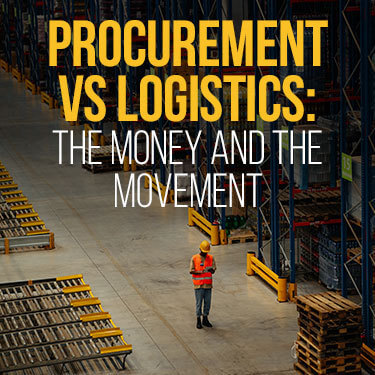
 Copy URL to Clipboard
Copy URL to Clipboard
For some organizations, a procurement team and a logistics team are one and the same. In others, they’re related partners that rely on each other’s skills and services. Whether one or the other, they serve vital roles in a business’ supply chain.
Key Takeaways:
Gain an understanding of these practices and how they work within a supply management system.
To figure out procurement and logistics, you need to know how they overlap and why.
Procurement is actually a process that covers the search, purchase, and shipment arrangements of materials and goods for a business’ use.
A procurement team will focus on things such as:
For a single procurement specialist or team, that’s quite a bit. The bigger the company, the more complex procurement and sourcing processes are.
These are all responsibilities that fall more under a logistics management umbrella. However, this doesn’t change the fact that procurement and logistics can still be defined separately.
Logistics is a general term used to describe anything involving product movement, such as shipping, storage, and fulfillment.
Logistics teams are multi-faceted and require experts in areas such as:
Since logistics is so broad, it’s necessary to define specific aspects and unique processes. For example, distinguishing between inbound logistics and outbound logistics. It’s as part of inbound logistics that we encounter procurement.
When it comes to the role of each within the supply chain, the easiest way to distinguish them is by noting what makes them different.

The term procurement logistics sometimes gets tossed around too. We’ve already established that they are separate activities. Why the term then?
The term procurement logistics places sourcing and purchasing within the greater category of supply chain management.
In this context, procurement processes are those specific to inbound logistics.
Realize that supply chain management doesn’t exist unless there are actual supplies, at least when it comes to your specific part in the chain. Procurement is what starts you off.
As such, it’s also what impacts every link that comes after. The quality of your procurement, from vendor selection to warehouse receiving, influences other supply chain activities, including:
Supply chain management tries to balance supply, production, and demand. Too little or too much in any of those areas is bad for business. When a procurement manager is doing the job right, supply chain management knows what supplies are available or still needed.
For procurement processes to remain effective, logistical support is needed. Once goods are found and purchased, there’s still the matter of getting them to their destination.
Since logistics is focused on the movement of goods, it helps by providing the following services:
In a small business, many of these responsibilities will overlap. As a business grows, however, needs often become more specialized to better manage increased quantities. Without the right support systems in place and experts to manage them, companies may be left dealing with:
If you’re already dealing with these issues, then it’s time to take a look at how to improve both processes and what challenges you’ll face.
Improving logistics processes, and by extension your procurement, comes down to recognizing what causes the most disruptions and finding ways to mitigate the effects. Avoiding all disruptions may be impossible.
The goal is to focus on best practices that minimize how often they occur and make your supply chain management flexible enough to survive the issues that can’t be avoided.
Best practices that help procurement specifically, and logistics in general, include:
Finding supplies and materials can be challenging. Many companies have learned the hard way that single-supply sourcing can fall apart easily.
A procurement team needs to think creatively and more globally than ever before. Clear communication, good training practices, and standard policies help keep things on track.
The battle for better procurement and logistics services is more intense than ever. As prices of materials and shipping rise, you need a support team that knows how to call the shots.
Fulfillment and Distribution has decades of experience. It also has the reach to help you make your business succeed no matter where you’re located.
Our diverse service offerings include:
Call us today at (866) 989-3082 to speak with one of our fulfillment specialists directly. If you need answers fast, request an online service quote today. Better supply chain management is within your reach.
